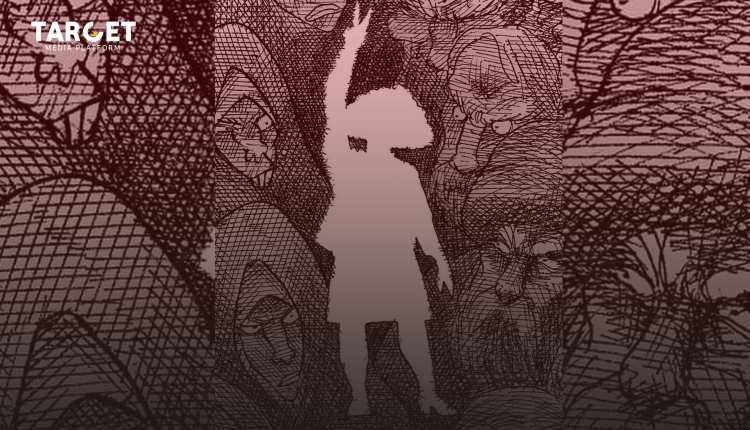A scream for freedom from inside an Iranian prison
“I will continue to fight for freedom and equality, even if costs my live and I won’t give up until we will achieve democracy”
– Narges Mohammadi –
Within the fateful walls of the infamous Evin Prison, known for brutish torture and the imprisonment of political opponents, Narges Mohammadi breaks her silence to draw the world’s attention to her situation with a powerful letter. Her appeal against the “forced veil” and for freedom and equality reflects not only her personal struggle, but also the resistance against an oppressive regime. This letter, written amidst medical hardship and the harsh sentence of imprisonment, provides a moving glimpse into the challenges Narges and others must overcome in the pursuit of dignity and democracy.
The Islamic Republic’s judicial prosecutor announced on November 15 that Narges Mohammadi would be denied urgently needed cardiac treatment because of her obstinate refusal to wear the “forced veil.” The Attorney General’s decision not only raises serious questions about the respect for basic human rights, but also sets a distressing precedent for the dilemma between medical necessity and state oppression.
On November 8, 2023, after just a few hours in the hospital, prison authorities decided that Narges Mohammadi had “no serious illness” and she was immediately sent back to prison to complete her sentence. This rapid transition from the medical facility back to prison immediately raised doubts about the objective assessment of her health situation.
However, a report from the hospital’s heart specialist on November 9, 2023 revealed an alarming reality. Narges Mohammadi suffers from two upper vein blockages, fluid buildup around the heart and severe inflammation in the esophagus. The imperative need for angiography was emphasized to assess and appropriately treat the life-threatening health risks.
The situation further escalated when, on November 15, during the promised transfer from prison to hospital, the prosecutor decided: “Narges Mohammadi cannot go through it. The message of the Islamic Republic is: either death or compulsory veil.” This shocking decision not only poses an immediate threat to their lives, but also raises the question of whether medical care is being used for political purposes.
Narges Mohammadi says: “Forced veiling is pathetic, I will resist it as a means of oppression and control over society.”
Her letter:
After two months of refusing to be transferred to the heart hospital and three days of hunger strike, I was finally sent to the hospital on November 8th. After tests, CT scans and CT angio under strict security conditions, I was immediately sent back to prison. Hours later, the prison organization announced in a statement: “Narges Mohammadi was sent to the hospital and, after examination, due to the absence of serious problems, was returned to prison to continue her sentence.”
At the hospital, in my presence, prison officials and security guards promised to visit the hospital on November 9 and receive the results of my tests. This was agreed upon on the condition that even my lawyers and close family were not allowed to come near me or talk to doctors about the hospital treatment process. Why?
Prison officials and security forces reneged on their promise on November 9th. Hesitantly, my lawyer went to the hospital on November 11th, received the results and handed them over to the prison at 10 a.m. that same day. This happened while I was learning in a phone call with my family at 6:20 p.m. that same day that the results of my tests were very worrying. My family informed me that I had two upper vein blockages, fluid around the heart and severe inflammation in the esophagus and needed an urgent angiography. I was completely clueless and the prison not only did nothing but also hid it from me. Why?
That night, my cellmates and I went to the prison office. But they refused to give answers. Why?
On Monday, November 12th, they brought a cardiologist to the women’s area. After studying the results in the presence of the head of the women’s area, the deputy prison guard, the head of health care of Evin and the doctor of the Evin clinic, he explained that I have two superior vein occlusions and need to do an angiography because the veins are up could be 70/80 percent closed. He emphasized that an angiography was necessary. When I asked about the timing of the transfer, the head of the women’s division said: “We can’t decide; we need the prosecutor’s permission. It is the prosecutor’s order.” Why?
Today, November 15th, after receiving permission from the prosecutor and coordinating with the hospital for an emergency angiography, I went into the hallway at 9 a.m. The head of the division said: “The prosecutor has given a written instruction. You can’t go outside.” He said, “Yes, but if you don’t wear hijab, angiography won’t be done.” I think no further explanation is needed and anyone who reads this will understand that the oppressive religious regime uses every opportunity to incite fear, intimidation, oppression, massacres, torture and destruction in society in order to gain power receive. It is our humanitarian duty not to remain silent in the face of the ruthless and oppressive regime and not to allow ourselves to be deterred from resisting and fighting.
I, Narges Mohammadi, declare that the “forced veil” is one of the powerful tools of the women-oppressive religious regime to create fear in society. Under no circumstances will I support him.
Today, November 15, the Islamic Republic’s Judicial Prosecutor announced that despite our certainty about Narges’ urgent need for cardiac treatment, her treatment will not be permitted due to her refusal to wear the “forced veil.” And I declare with a loud voice: I will stand up for freedom and equality, even if it costs my life, and I will not rest until democracy is achieved. I will resist the “veil of compulsion” not only in words, but also as Mansa, Nika, Ghazalen, Sarina and Armita did, and pay with my life”.

